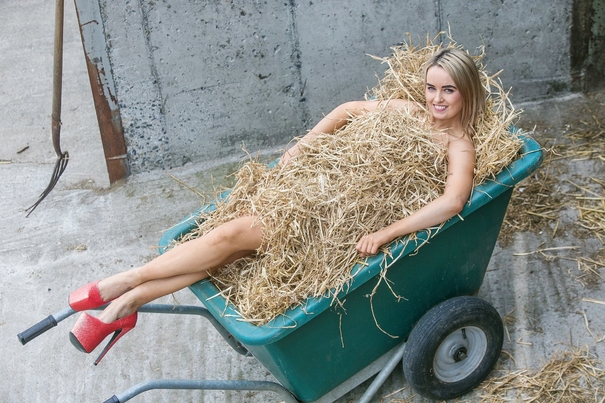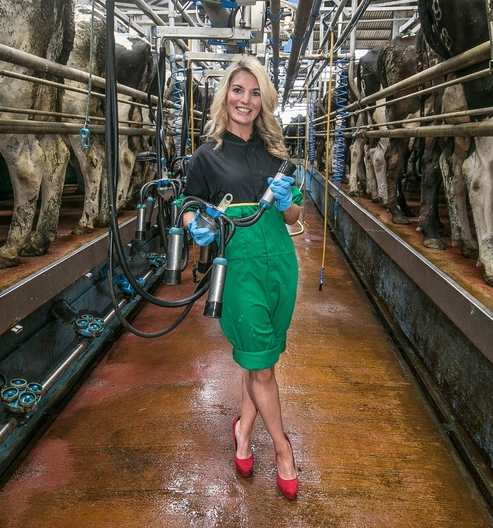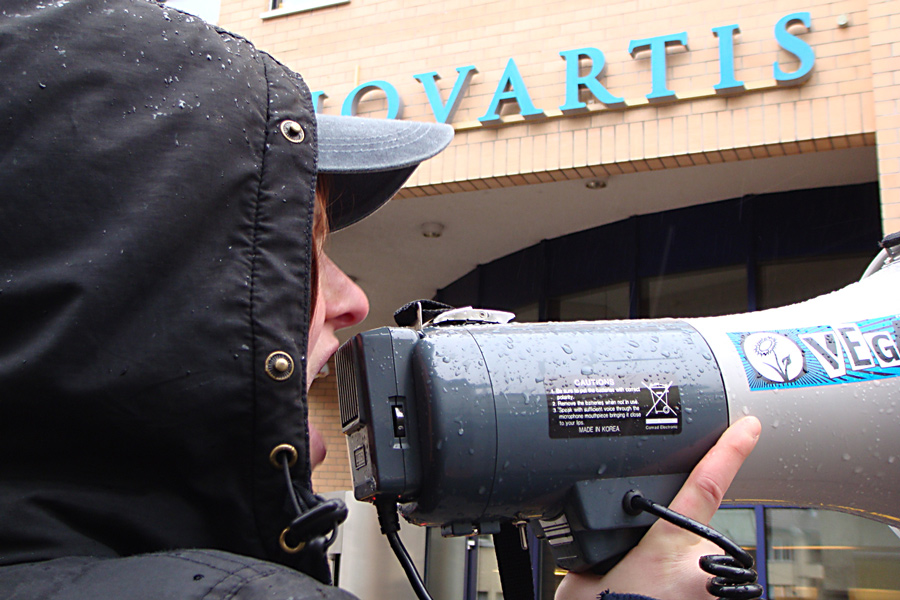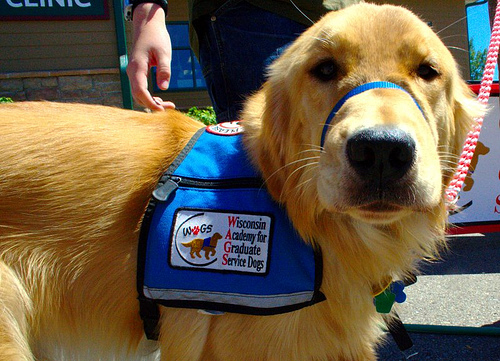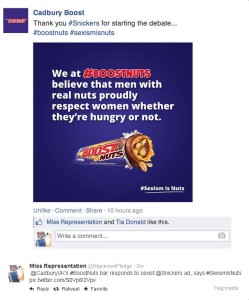We Are Not Advocacy Robots

At the 2015 Sistah Vegan conference, Dr. Breeze Harper featured an amazing talk on self-care by Jessica Rowshandel, LMSW (the conference recordings are available for purchase on Dr. Harper’s website). What I enjoyed about the talk was that it offered a few clear suggestions (most notably, the importance of friendship and community), but it was also realistic about the barriers many social justice activists face in practicing self-care. Self-care really can be a luxury for some, and sometimes, we just can’t afford to engage it (financially, time-wise, ability-wise, etc.).
Sometimes it’s more than physical or material barriers that prevent us from prioritizing the self. Sometimes, it can be a matter of female identity or our current position in the activist journey. Women are socialized to be givers, to be selfless, to expect abusive behavior, and to be objects for the resources of others. This feminine identity, then, can really get us into some tough spots in our activism, especially when the activist space is patriarchal, as the Nonhuman Animal rights movement is.
But also, the typical activist, I think, experiences an identifiable growth cycle. We learn about injustice, we get angry, and we stay in a rage. We get involved in the movement, we build connections with others, and we learn that social movements are highly contentious spaces with lots and lots of in-fighting and abusive behavior (particularly by men). We rage some more. And then, as the years pass, either we drop out or we start to adopt a sort of activist wisdom. We learn that the schisms and abuse are normal parts of collective behavior, just as they are normal parts of the outside world we wish to change. That doesn’t make it okay, it simply means that we need to prepare for this inevitability. Women and especially empathetic people are going to very sensitive to this constant negativity (and these are the very types of people attracted to the movement). At some point, we have to make changes in how we choose to expend our energy in order for our activism to be sustainable and in order to remain healthy.
For those of you who have pre-existing issues with depression, anxiety, and abuse (if you are female-identified, statistically, this probably includes you, my dear reader), the added stress and vulnerability created by our activism can really become a huge burden. There are a lot of things in this world that we cannot control, but activism is one thing that we can. And while many of us do not want to cut out activism from our life (especially because it can be extremely rewarding to give back through pro-social behavior and because our activist networks can be a positive addition to our lives), we need to recognize that there must be boundaries.

Photo from The Frisky
Finding boundaries and having the mental strength to reinforce those boundaries is something that I’ve really been working with. I have to stay out of vegan groups, because I know that internet spaces invite vitriol and aggressive behavior. I have to disable comments on my blogs, because, again, the anonymity of the internet and my female identity makes my online activity a beacon for vitriol and aggressive behavior. I have to reevaluate how I will spend my time blogging: will I use the space to vent my frustration on yet another abusive person or corrupt organization? Sometimes that is necessary. But it’s also important to start engaging positive contributions.
As the summer begins to settle in this year, I’m finding myself emerging from a very gloomy winter and spring, wondering what I can do to heal from these past few months. I’m trying to find my grounding after the death of my best friend, the death of my dog, the brutal academic job market, the poverty of graduate school, revising my book, finishing my dissertation, being apart from my partner for many months, a very toxic family situation, and waves of harassment from anti-feminists, neo-nazis, and sexist or racist vegans. I mean, woah. That’s enough to bring anyone down. It’s time to come up for air. With so little out of my hands, it is prudent to ask myself: what exactly can I control?
It’s really important for us to recognize that we are humans. We are not advocacy robots: we have feelings and weaknesses. We get run down, we get tired, we get our feelings hurt, and we find it hard to trust. Doing what we do is hard work. Let’s be honest about the reality of activism. It’s totally okay to acknowledge that sometimes it becomes too much to take.
My plan for Vegan Feminist Network this upcoming summer is a little bit in the air. I’m spending the next three months in Ireland with my partner, and I hope to stay off the internet as much as possible. I want to reconnect with him, cook healthy vegan food, squeeze in some hiking and a 5k, explore the pubs, and just allow myself to live (though I couldn’t help but pack some vegan leaflets!). Again, self-care can often be expensive. I have the privilege of taking the summer off because I am an online instructor, and we were fortunate enough to “afford” (i.e. go broke on purchasing) an expensive plane ticket (which is several months salary for many graduate students like myself). Some people might have financial security, but no loved ones to spend time with. Some people have families depending on them, and time is just not available. I know everyone has barriers, but we need to do what we can with what little we have to nourish our mental health.
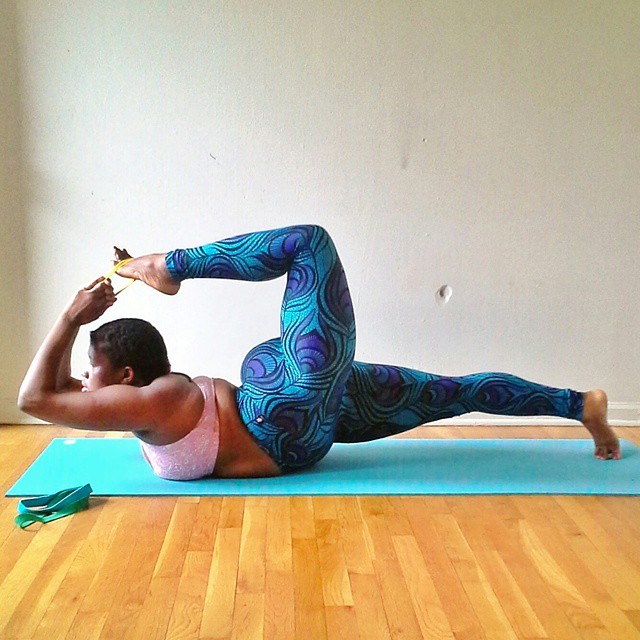
Jessamyn Stanley; Photo from Jessamynstanley.com
I have discovered that yoga is one of those concrete ways that we can actually do something to repair ourselves from the damages of patriarchy and toxic activism. And it’s inclusive. There are variations of yoga for all body types and ranges of ability. In activist spaces, so often we focus on the mental emancipation through critical theory, learning, reading, and studying. Yoga is the other half of that–it helps us regain awareness and control over our bodies. Much like veganism, yoga is feminist praxis. For someone like me that has suffered with anxiety for my entire life, I have found that it is an amazing reward to my battered self to just take some time on the mat to stretch and breathe.
And you don’t need any expensive equipment–just comfy clothes and bare feet. I finally splurged on a mat, but it’s not necessary for yoga, just a nicety. For those who cannot afford yoga classes (like me!) or who are geographically isolated (like me!), yoga is freely available online (and allows you to practice from the peace and privacy of your own home). I have found Yoga with Adriene to be an amazing gift. Particularly helpful is her 23 minute “Yoga for a Broken Heart,” which is a gentle, beginner’s level session that will relax and soothe. See also the Instagram and Tumbler of Jessamyn Stanley, who combats the white- and thin-centricism of yoga practice in the West with body-positive curvy yoga. Or, Chelsea Jackson, who integrates critical thinking in her yoga practice for Black-identified persons facing trauma. “I see yoga as a tool to dismantle structural oppression,” she says. “It can help us interrogate systems that are constantly putting us in boxes or marginalizing us.”

Chelsea Jackson; Photo from Yoga Journal
Finally, if you are fortunate enough to have a companion animal in your family, give them a snuggle. Research shows that interacting with them can lower blood pressure and ease anxiety.

If all else fails…flip to a random page and prepare as directed (with appropriate modifications for my gluten-intolerant and diabetic friends!). I have heard many say that cooking and baking is a calming experience. And cupcakes are happiness, no doubt about it.

I agree with Jessica Rowshandel in the acknowledgement that self-care will differ for every individual, and sometimes it’s hard for us to really take it seriously and work it into our schedule. Most of us lack the space, money, freedom, or motivation necessary to take time for ourselves. I don’t have all the answers, but I do want to start a dialogue. Some of you reading this might be new on your activist journey and just want to saturate yourself in negativity and fight through it all, but I have a feeling you will reach a point where you must acknowledge that boundaries are necessary. When you reach that point, I hope your remember this post and revisit it. I may revisit this post as well, as I may have new ideas or experiences to share. In the meantime, you may want to take a peek at this step-by-step self-care guide presented by one of my favorite Black feminist blogs, For Harriet.
Take care and be well my friends.
 Dr. Wrenn is Lecturer of Sociology. She received her Ph.D. in Sociology with Colorado State University in 2016. She received her M.S. in Sociology in 2008 and her B.A. in Political Science in 2005, both from Virginia Tech. She was awarded Exemplary Diversity Scholar, 2016 by the University of Michigan’s National Center for Institutional Diversity. She served as council member with the American Sociological Association’s Animals & Society section (2013-2016) and was elected Chair in 2018. She serves as Book Review Editor to Society & Animals and has contributed to the Human-Animal Studies Images and Cinema blogs for the Animals and Society Institute. She has been published in several peer-reviewed academic journals including the Journal of Gender Studies, Feminist Media Studies, Disability & Society, Food, Culture & Society, and Society & Animals. In July 2013, she founded the Vegan Feminist Network, an academic-activist project engaging intersectional social justice praxis. She is the author of A Rational Approach to Animal Rights: Extensions in Abolitionist Theory (Palgrave MacMillan 2016).
Dr. Wrenn is Lecturer of Sociology. She received her Ph.D. in Sociology with Colorado State University in 2016. She received her M.S. in Sociology in 2008 and her B.A. in Political Science in 2005, both from Virginia Tech. She was awarded Exemplary Diversity Scholar, 2016 by the University of Michigan’s National Center for Institutional Diversity. She served as council member with the American Sociological Association’s Animals & Society section (2013-2016) and was elected Chair in 2018. She serves as Book Review Editor to Society & Animals and has contributed to the Human-Animal Studies Images and Cinema blogs for the Animals and Society Institute. She has been published in several peer-reviewed academic journals including the Journal of Gender Studies, Feminist Media Studies, Disability & Society, Food, Culture & Society, and Society & Animals. In July 2013, she founded the Vegan Feminist Network, an academic-activist project engaging intersectional social justice praxis. She is the author of A Rational Approach to Animal Rights: Extensions in Abolitionist Theory (Palgrave MacMillan 2016).
Receive research updates straight to your inbox by subscribing to my newsletter.
 Dr. Wrenn is Lecturer of Sociology. She received her Ph.D. in Sociology with Colorado State University in 2016. She received her M.S. in Sociology in 2008 and her B.A. in Political Science in 2005, both from Virginia Tech. She was awarded Exemplary Diversity Scholar, 2016 by the University of Michigan’s National Center for Institutional Diversity. She served as council member with the American Sociological Association’s Animals & Society section (2013-2016) and was elected Chair in 2018. She serves as Book Review Editor to Society & Animals and has contributed to the Human-Animal Studies Images and Cinema blogs for the Animals and Society Institute. She has been published in several peer-reviewed academic journals including the Journal of Gender Studies, Feminist Media Studies, Disability & Society, Food, Culture & Society, and Society & Animals. In July 2013, she founded the Vegan Feminist Network, an academic-activist project engaging intersectional social justice praxis. She is the author of A Rational Approach to Animal Rights: Extensions in Abolitionist Theory (Palgrave MacMillan 2016).
Dr. Wrenn is Lecturer of Sociology. She received her Ph.D. in Sociology with Colorado State University in 2016. She received her M.S. in Sociology in 2008 and her B.A. in Political Science in 2005, both from Virginia Tech. She was awarded Exemplary Diversity Scholar, 2016 by the University of Michigan’s National Center for Institutional Diversity. She served as council member with the American Sociological Association’s Animals & Society section (2013-2016) and was elected Chair in 2018. She serves as Book Review Editor to Society & Animals and has contributed to the Human-Animal Studies Images and Cinema blogs for the Animals and Society Institute. She has been published in several peer-reviewed academic journals including the Journal of Gender Studies, Feminist Media Studies, Disability & Society, Food, Culture & Society, and Society & Animals. In July 2013, she founded the Vegan Feminist Network, an academic-activist project engaging intersectional social justice praxis. She is the author of A Rational Approach to Animal Rights: Extensions in Abolitionist Theory (Palgrave MacMillan 2016).
